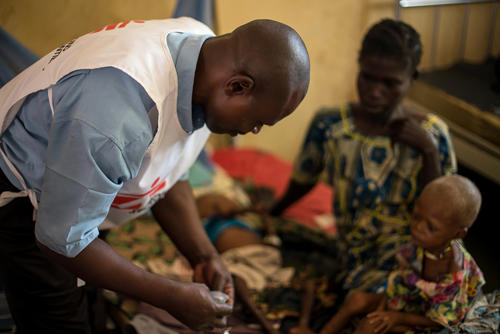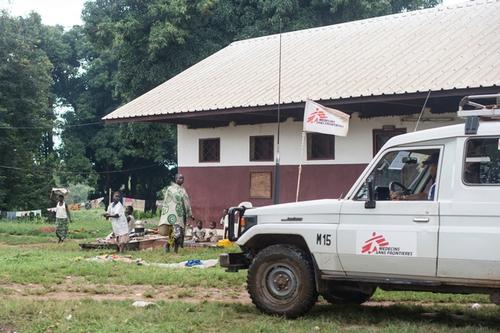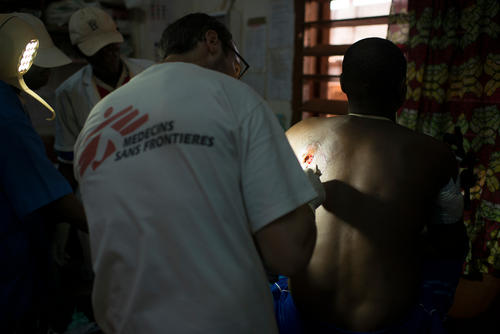Sébastien Jagla, MSF project coordinator in the north of Democratic Republic of Congo, describes the challenges to provide humanitarian assistance to Central African refugees, constantly on the move between two places and with no real home.
“Refugees from the Central African Republic (CAR) in the north of the Democratic Republic of Congo (DRC) can be invisible at times. Since mid-2017, tens of thousands have fled a brutal conflict and settled over the last months on the other side of the Ubangi river, in the Congolese districts of Gbadolite and Mobayi-Mbongo. The current number of refugees stands at approximately 42,000, fewer than the approximately 67,000 at the peak of the displacement some months ago.
It is difficult to trace them. Many are still looking after their fields and remaining properties just a few kilometres away and they go back sporadically to look for food and subsistence. They are constantly on the move, living in uncertainty as part time-refugees and part-time returnees, without really benefitting from either status and being subjected to violence and harassment by different parties on both sides of the river.
Mixing with the local communities
Some have managed to blend into the local communities or to live next to them in small settlements in villages and towns across the riverine Congolese border. They have built their own shelters: usually wooden huts. This allows them to fish and farm while remaining close to their country of origin. However, sometimes difficulties arise when accessing the existing resources and basic services.
Central African refugees in these areas are somewhat removed from the camps where humanitarian assistance from the DRC authorities and UNHCR is concentrated. They are also more difficult to access for the few aid organisations present in a remote region where logistics pose big challenges to intervening in a crisis which, on top of this, has not raised much attention.
Risky crossings
Many of the refugees continue to periodically cross over into CAR despite often facing violence by armed groups on the way or upon their temporary return to the country. As one refugee explained to us, some militiamen cut him with a machete because he went back to collect some remaining coffee harvest. The armed men argued that the refugee man was no longer entitled to harvest since he had chosen to live on the other side of the river.
Other refugees have spoken of similar accounts about their return journeys, but also stories of disputes with local Congolese people when accessing water points or dividing the manioc harvests they were allowed to collect for the benefit of both communities.
Scattered humanitarian assistance
These daily tensions and, more importantly, the risky returns to an obviously unsafe place, would probably be less prevalent if there were proper humanitarian assistance in place, but what we have seen over the past six months of intervention is that these crossings have become common practice, while the crisis has not managed to raise any kind of awareness.
While this may not be an emergency in terms of mortality and child malnutrition levels, our fixed and mobile teams have observed prevalent severe diseases, with malaria, diarrhoea and respiratory tract infections being the most common, a usual pattern in displacement crises. Our teams see very vulnerable people who deserve attention in a context in which the already limited health system and basic services have become clearly overstretched, consequently affecting the host community as well. The lack of visibility and knowledge of this vulnerable population undermines the capacity to address their needs.”
MSF worked between mid-September 2017 and the end of March 2018 supporting two hospitals and nine health centres in the northern Congolese districts of Gbadolite and Mobayi-Mbongo and running mobile clinics for both refugees and the host community.
Teams provided more than 38,600 medical consultations, admitted 3,970 inpatients, treated nearly 2,000 children under five for malnutrition and vaccinated 20,000 children for measles as part of a vaccination campaign against a range of other diseases. Its logistical teams have also helped to improve water and sanitation conditions by constructing 13 boreholes and rehabilitating other water sources.
The intervention has now been handed over to the Ministry of Health after some staff received training, while MSF keeps a surveillance system in Nord-Ubangi province in order to be ready to intervene should an emergency develop.
Since May 2017, MSF has also been providing medical care in the village of Ndu, east of Gbadolite, to more than 12,000 refugees from the Central African city of Bangassou. After an attack on its staff last November, MSF suspended its activities in Bangassou but continues to provide remote support to CAR refugees in Ndu.






